East Coasters are just about finished with it, but Californians have another couple of hours to get home and turn on Turner Classic Movies in order to watch Richard Schickel‘s Spielberg on Spielberg doc, which I suspect sight unseen is going to be one of the most exuberant acts of televised fellatio ever broadcast. A Spielberg career appraisal that fails to salute his truly exceptional films would be, of course, derelict, and you can count on Schickel begin his usual vigilant self in this regard. But will he have the cojones to speak the truth about Spielberg’s so-so, second-tier and flat-out-bad films — 1941, The Color Purple, Always, Hook, Amistad, A.I., Catch Me If You Can, The Terminal and Munich?
Three things led to a change
There’s an Impeach Bush and Cheney office set up in West Hollywood now (8124 W. 3rd St., Ste #216, Los Angeles CA 90048), and until last week I was thinking “okay, nice sentiment but you’re dreaming.” But then three things happened in rapid succession that changed my thinking.
First was the Scooter Libby commutation the weekend before last, and then being floored by the Bush-Cheney record of arrogance and stupidity as I watched No End in Sight last Friday night, and now there’s Bush refusing to allow his aides testify under oath before Congress over the Justice Department firings.
The man is smug, indifferent and blinded by rightist ideology — clearly one of the all-time worst U.S. presidents in the nation’s history. And yet the conventional thinking is that an impeachment drive is out of the question. The problem, sad to say, is that Democrats legislators aren’t made of sterner stuff. Bill Clinton came close to getting put out of office by impeachment for next to nothing — i.e, because he lied about getting a blowjob — but that didn’t stop the Republicans from pushing this issue for months and months and nearly bringing the executive branch to a standstill because of it.
“No End in Sight” trailer
Please, please look at the trailer for Charles Ferguson‘s No End in Sight (Magnolia, 7.27.07 in NYC — 8.3 or 8.10 in Los Angeles), and then go to the site and read the synopsis and reviews. Having seen it last Friday, I can say I’ve never been made to feel so real-world enraged by a movie in all my life. Ferguson’s merciless analysis of the Bush administration’s handling of the ever-worsening situation in Iraq beginning in May 2003 is truly sickening.
As of this writing, No End in Sight is an absolute contender for Best Feature Documentary. I had a somewhat thorough but not very detailed grasp of the situation in Iraq before seeing it. After seeing it I felt as if someone had leaned over and turned the lens and sharpened the focus. I’m hoping to speak with Ferguson later this week by phone, and then do a sitdown with him in Los Angeles later this month. I know full well that 97% of the moviegoers out there will do the typical vegetable thing — i.e, will never see it, never rent the DVD, never think about it. It would be nice if some would think about responding differently.
The website copy doesn’t lie: No End in Sight “is a jaw-dropping, insider’s tale of wholesale incompetence, recklessness and venality. Based on over 200 hours of footage, the film examines the manner in which the principal errors of U.S. policy — the use of insufficient troop levels, allowing the looting of Baghdad, the purging of professionals from the Iraqi government, and the disbanding of the Iraqi military — largely created the insurgency and chaos that engulf Iraq today.”
The most venal character the film is L. Paul Bremer, who was appointed by Donald Rumsfeld to be the head of the Coalition Provisional Authority in Baghdad. He exercised authority over Iraq’s civil administration from 5.11.03 to 6.28.04. Bremer’s decision to disband the Iraqi Army and remove Ba’ath party members from top government posts “helped create and worsen an atmosphere of discontent,” according to his Wikipedia page.
Iraq dead poster
Sky News is reporting that some bad guys (the report isn’t specific) are waging a kind of online psychological war aimed at U.S. troops by posting a series of mock-up Hollywood film posters containing “a chilling message for U.S. troops in Iraq.” I would imagine that most U.S. soldiers over there will look at these images and go “haw!,” or certainly without breaking much of a sweat. If you ask me the zombies-in-Iraq-by- way-of-George Romero poster is the best.
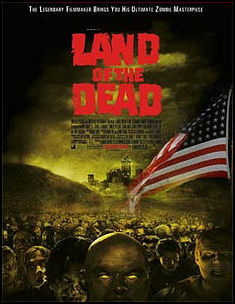
“11th Hour” and My Space
Leonardo DiCaprio‘s My Space page has just posted a video message about The 11th Hour (Warner Independent, 8.17), which he produced, co-wrote and served as one of the principal talking heads. Sound words, riveting message, and a film that definitely said it all but didn’t quite have that schwing when I saw it last May.
I don’t know if the trio behind The 11th Hour — DiCaprio and co-directors Nadia Conners and Leila Conners Petersen — have followed the suggestions I posted after seeing it at the Cannes Film Festival. Good and worthy as it is, I said it needed more in the way of personality and warmth and meditative passages.
“There’s no argument at all from this corner about the alarming things it says (and shows) about what amounts to a kind of mass global suicide,” I wrote, “but it’s a movie, and the fact is that it doesn’t breathe and engage the way a piece like this should. After 20 minutes or so it makes you feel like you’re being hammered. It needs to pull back and relax and…I don’t know, throw in some jokes or something. A little more heart and soul and meditation.
11th Hour “has exactly one laugh moment — a quote from Winston Churchill that says Americans “always do the right thing…unfortunately they only do the right thing after exhausting every last wrong possibility.” Or words to that effect.
“I hate saying this about a film I respect and that I want people to absorb for the content alone, but you can’t expect well-honed information and slam-bang visuals alone to do the trick. A movie needs to generate human warmth and aroma…some kind of emotional connection that really sinks in. As it is now, The 11th Hour is too dry and didactic, and it doesn’t even try to generate the amiable personality that An Inconvenient Truth had by way of the reborn Al Gore.”
I’m just saying this in order to help. It would be an excellent thing if everyone (and I mean everyone) saw this film and then sat down and thought hard about where to go and what to do.
CSI: Factory Girl
Even for a pseudo-Factory Girl fanatic like myself, this Stu Van Airsdale crime scene analysis is just too complicated. What can’t he just go with the Charles Taylor party line and be done with it?
Selling “Reservations” two ways
What is that rancid cotton-candy Aguilera or Spears-like pop song playing all through the trailer for No Reservations (Warner Bros., 7.27). Turns out it’s a Liz Phair track called “Count On My Love.” Just one listen and I hated it. Screechy and alley-catty with a piercing helium wail.

So now I’m asking myself why a film scored by the great Phillip Glass is sending an entirely different musical message than the one in the trailer? Is the clarinet solo music on the No Reservations website a Glass composition? It sends out a very soothing vibe and accomplishes the opposite effect of that godawful Liz Phair tune — it makes me want to see the movie.
Are Warner Bros. marketers trying to scare away the fans of Mostly Martha, the 2002 German film that No Reservations is a remake of, and attract the younger women who didn’t get all the jokes in The Devil Wears Prada? One thing’s for sure: when a movie sends out radically conflicting musical messages in different ad mediums, there’s some kind of conflict going on between the filmmakers and the marketers.
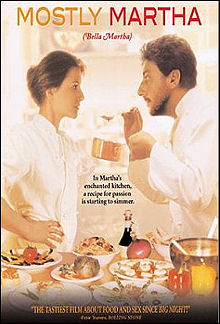
I’m told that some LA screenings of No Reservations have been set up, but no one I know has been invited to any. I don’t know if the film is good or bad or so-so, but Warner Bros. has almost everyone convinced that there’s some kind of problem.
And if this is so, the feeling among the natives (i.e., myself and the people I talk to) is how could this have happened with such great source material to start with? Sandra Nettlebeck‘s Mostly Martha is one of the all-time best adult romances, best foodie movies and best mother-daughter stories all in one. And how could this have happened with the assistance of Scott Hicks, a once-promising director who delivered the very moving Shine not that many years ago?
This may or may not apply to No Reservations, so let’s make it rhetorical: why is it that when Americans remake European films they always feel the need to gloss things up…to make them much broader and dumber and more lower-com- mon-denominator than the original? Are American audiences simply thicker and shallower than European auds? Is the European need for sugar stimulation lower than that of Americans?
Deathly Hallows spoilers
Certain readers have actually said they’re actually going to avoid this site come July 21st because they’re certain I’m going to spoil the ending of J.K. Rowling‘s Harry Potter and the Deathly Hallows, which will go on sale just after midnight. They need to brace themselves for shocking news. The media world en masse is going to spoil the ending. You can disconnect your TV and your computer and wear earmuffs on your way out to your rented cabin in northern Idaho with your car radio shut off, and Harry’s fate will find you out.
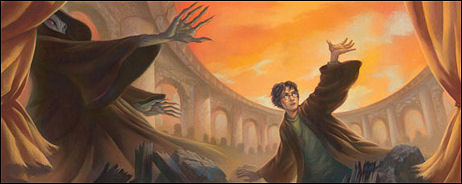
As N.Y. Times “Paper Cuts” blogger Dwight Garner wrote this morning, “The journalistic onslaught is…just… beginning.” I especially like this quote from a recent Stephen King column about the book’s final chapter: “The only thing we can be sure of is that `Deathly Hallows’ won’t end in a 10-second blackout.”
The Deathly Hallows Wikipedia page says that hallows “is a word usually used as a verb, meaning ‘to make holy or sacred, to sanctify or consecrate.’ However, in Harry Potter and the Deathly Hallows, the word hallows appears as a noun. Hallows can refer to saints, the relics of saints, the relics of gods, or shrines in which the relics are kept. Since the essence of these saints or gods were often considered present at their shrines and in their relics, hallows came to refer to the saints or gods themselves, rather than just their relics or shrines.”
Another Scrooge
There’ve been four versions of Charles Dickens‘ A Christmas Carol (the 1938 Hollywood version, the 1951 British version with Alistair Sim, the George C. Scott version and Scooged! with Bill Murray), and now a fifth is on the way — a digital 3D/performance capture version for the family trade with Jim Carrey as Scrooge, and Robert Zemeckis writing and directing for Disney. If Zemeckis is willing to go dark and spooky (in the vein of the ’51 British version), this could be intriguing with the visual opportunities provided by the three ghosts and the flashbacks and flash-forwards.
Pig lighter

“Pig lighter” purchased at Ralph’s on Ventura and Coldwater — Sunday, 7.8.07, 2:15 pm. Flames come out of both nostrils.
Don Murphy and fans
N.Y. Times reporter Laura M. Holson on the whole boolah-boolah about Transformers fans being not only listened to but creatively consulted by producer Don Murphy during pre-production, as well as the recent who-did-what scuffle between Murphy and producer Lorenzo Di Bonaventura and director Michael Bay.
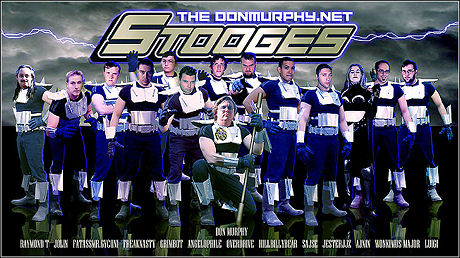
Composite photo of Don Murphy/Transformers fan community,
designed by a Transformers fan for donmurphy.net.
“Phoenix” fatigue
Harry Potter and the Order of the Phoenix (Warner Bros., 7.11), the fifth in the series, is unmistakably darker than the previous four Potters. But for me, there’s nothing so dark and foreboding as the idea of having to sit through two more of these damn things, which is what we’re all looking at.
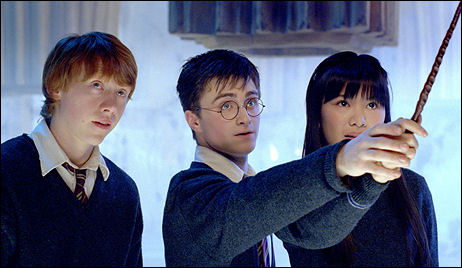
Phoenix slams the teenaged Harry (Daniel Radcliffe) against the wall and makes him glare with rage as he responds to various taunts and assaults and rivers of inner doubt. I didn’t take any of this horseshit seriously, of course, because I regard the Potter movies as corporate CG charades looking to make as much money as they can with zero regard for anything else.
Phoenix is a spooky, shadowy mood piece and far from atrocious, although it’s too damn busy — it tries so hard to be an intense experience that I was wishing it would just shut up and calm down and try some silent passages, like M. Night Shyamalan has done from time to time.
Give Rowling and the filmmakers credit for at least trying to add fresh elements. The nicest alteration is Harry becoming a kind of wizardly arts after-school tutor. (Unofficially. Without the Hogwarts faculty knowing. Don’t ask.) The teaching scenes aren’t about much, but there’s a certain charm and comfort in watching Harry pass along what he knows because he’s gifted at it. But the dominant change in Phoenix is an atmosphere of foreboding like the Potter fans have never seen or felt.
There’s a lot of water-treading in Phoenix, but the central nightmare is about the spirit of the wretched Lord Voldermoort (Ralph Fiennes) somehow infecting or entering poor Harry the way Darth Vader’s heart of darkness threatened to overtake Luke Skywalker. Yes — another summer tentpole movie is dancing the same old tango.
So there’s “darkness” in this film but nothing that truly hurts or terrifies or even gives pause. A good-friend-of-Harry character dies in Act Three but you don’t feel a thing when it happens. I don’t give a hoot about anyone dying in the Potter films, frankly. The whole series could go away tomorrow and my life wouldn’t miss a beat.
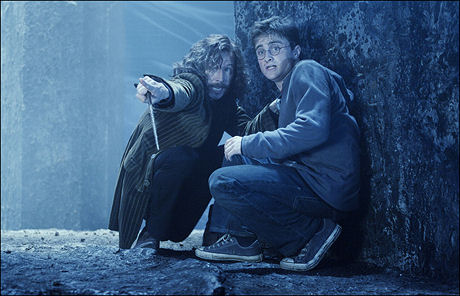
Actually, I take that back as far as Emma Watson‘s Hermione is concerned. She’s not the bossy boots she was in the earlier films — she’s been marginalized — but she’s still my favorite character. Otherwise I feel no affection or investment in Potter Incorporated. The films are something to step around and turn away from.
I saw Radcliffe in a stage play of Equus in London last March. He’s a very focused and intense actor, and he has my respect. But he’s so focused and intense and marble-eyed as Harry Potter that he acts like a kind of narcotic. And I’m getting awfully tired of Harry’s obsession with his the murder of his parents. It was sad, tragic and terrible, but his inability to get over it and live his life isn’t just repetitive and indicative of arrested development — it’s noxious.
There’s a chaste kissing scene in Pheonix between Radcliffe and Katy Leung, an Asian hottie with black bangs and a roundish face and a button nose. The kiss doesn’t lead to anything or affect the story in the slightest way, so I’ve no idea why it’s in the film to begin with. I was asking myself why doesn’t Harry try to do a bit more. He’s 17, for Chrissake. Of course, it’s not Harry kissing her but the director, David Yates, in a sesne. And you can tell he feels deeply uncomfortable about it.
People are free to patronize and enjoy the Potter films. They are not bad people for doing so. They’re easy lays, of course, but easy lays are good for the economy. I’m a little bit sorry there aren’t a few more Potter haters out there, but I can roll with it. I just didn’t grow up with the Potter books and I’m not spiritually invested in the, like my son Jett is. I was marginally into the first two films, but I got off the boat after the Alfonso Cuaron version in ’04.
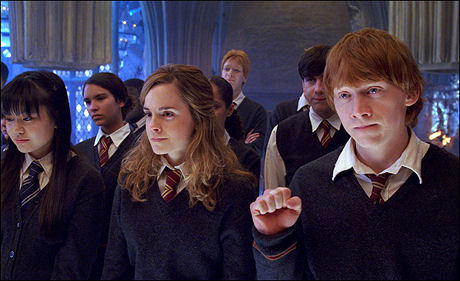
I could maybe tolerate them if the stories and the kids would just get the hell out of Hogwarts and into the real world, but they won’t leave the damn place. Rowling has so decided and that’s that. As far as I’m concerned Hogwarts has become a kind of Devil’s Island. I’m imagining a film poster for Escape From Hogwarts, with a visual of Radcliffe digging his way through a cement-block wall with a kitchen spoon.
There’s no avoiding the tired old thought that the Harry Potter books are being written and the Harry Potter movies are being cranked out for the benefit of the very few. Outside of the reactions of the delighted fan base, the idea isn’t to tell stories that thrill and enthrall and teach lessons. These books and films are saturating our world so that various parties in the publishing, merchandising, movie-making and acting professions can make big bags of money.
Does anyone find this fact the least bit entertaining? There are several first-rate British “name” actors in these films who are pocketing very nice Harry paychecks — good for them. Didn’t I read something about Radcliffe expecting to earn $30 million when all is said and done? But there’s nothing in it for me.
I was in hell the minute I realized from an early Pheonix trailer that Imelda Staunton would be playing a one-note performance from start to finish. Every moment she was on-screen I felt as if I was turning on a spit over the hottest bonfire. What is a character like Staunton’s — a naysaying, control-freak teacher named Dolores Umbridge — doing with power at Hogwarts? It’s nonsensical that a person with her attitude and temperament — a prim, plugged-up “no” person dressed in pink — would be there. The Hogwarts staffers are all eccentric types, some tugged by dark impulses and weird flicks of the brain, but they’re all rather spiritual in this or that way. Staunton’s is anything but.

Why after all these years are the Dursleys (Richard Griffiths, Fiona Shaw and their grotesquely ugly fat son) still openly hostile to Harry and treating him like an unwanted pest? Does that make any sense at all to anyone on the planet? Why with his powers is he even living with these cretins?
The central idea in the Rowling books is that wizard society is secretive, closed-off and very much unto itself. Too much so. Watching a Potter film is like submerg- ing yourself in a kind of isolation tank. No traces or remnants of the day-to-day texture of the year 2007 — a world completely divorced from everything except what Rowling and various directors have imagined. Except the most exciting alternate- world imaginings are always about reflections of the real world.
At the halfway mark I wanted to leave and just walk around the WB lot and get some air. But I stayed and toughed it out. God, that was a long 139 minutes! And all of it endured so we can share in Harry’s big final realization that he has some- thing to fight for, and that he pities Lord Voldemort for having no warmth or love or camaraderie in his life.
I managed to stay in screening room #12 for the whole film by (a) ordering myself to stay and yet (b) allowing my mind to wander and think about other things.
I was thinking about Lord Voldemort wanting to have sex with a Quantas stewardess during a flight, but her turning him down because he has bad stinky breath and no nose.
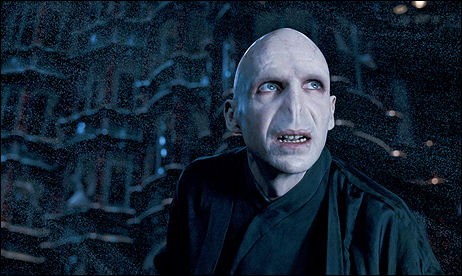
I was thinking about the absolute uniformity of super-villains in super franchises — Lord Voldemort, the Smiths in the Matrix movies, the Green Goblin, Darth Vader, Magneto, Megatron, Emperor Palpatine and all the other big-screen baddies are pretty much the same character. The variations are so slight as to barely register. I know that when a villain make his entrance, I usually mutter “oh, Jesus…here we go.”
Here’s a Wikipedia page analysis of the various kinds of villains — the Dark Lord, the Evil Genius, the Fallen, the Sociopath, the Mercenary, the Minion, the Beast, the Demon and the Trckster. Okay, maybe some differences exist, but from my perspective they’re all jaded, they’re all perverse and they can all go jump in a lava pit.
And I was also thinking about whether Harry will soon come to a literal end. On paper, that is. This got me through some of the slow parts. It’s been widely reported that J.K. Rowling‘s seventh and final installment, Harry Potter and the Deathly Hallows (out 7.21), will deliver two deaths, and the speculation is that Harry’s could be one of them. It doesn’t seem right. Such a young guy with so much to live for and fight against, and with such smarts and passion…and Rowling is thinking about offing him? That’s hard to accept.

